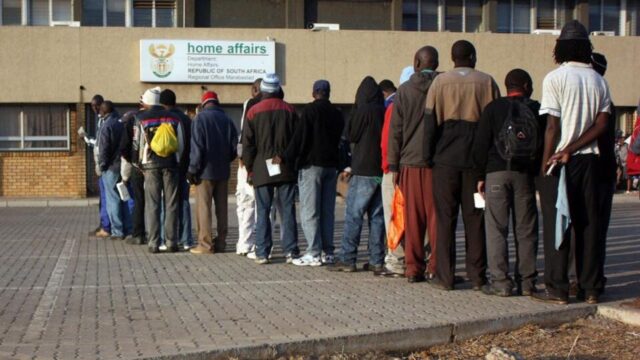As we start the new year, more than two million South Africans are still waiting for Home Affairs to unblock their identity documents and thus “unblock their lives”.
AS WE START the new year, more than two million South Africans are still waiting for Home Affairs to unblock their identity documents and thus “unblock their lives”.
The Gauteng High Court, Pretoria, in September reserved judgment in an application by Lawyers for Human Rights and several other civic organisations in which they challenged the conduct of Home Affairs to block certain people’s IDs, leaving them out in the cold.
Judgment is expected to be delivered within a month or two.
Lawyers for Human Rights, which represented a host of clients whose IDs are blocked, said that in May 2012 the department initiated a campaign to address the issue of “duplicate IDs” on the National Population Register.
Initially, about 29,000 IDs were identified. The figure escalated to about 500,000 IDs within a year.
The department reported to Parliament that the issues originated during the consolidation of apartheid-era population registers into the National Population Register before the 1994 elections.
The department distinguished between duplicate ID cases (one person sharing an ID number with multiple people) and multiple ID cases (one person assigned multiple ID numbers).
By August 2013, it published a notice of its intention to “invalidate” and “cancel” all unverified duplicate IDs by the end of 2013. The IDs had been blocked on the National Population Register by the time they were advertised.
Lawyers for Human Rights said that the ID blocking practice had become increasingly arbitrary, affecting a growing number of people.
In the past five years, Lawyers for Human Rights has assisted more than 500 people – most marginalised, black South Africans. It said none of them were aware of their blocked IDs until they tried to access another service.
It said the criteria for blocking IDs appeared to be based on subjective and discriminatory facts, such as the shape of inoculation marks, record of frequent cross-border travel, alleged deportation records, inability to speak a specific local language, bearing a “foreign-sounding” name, or having a parent or spouse of foreign nationality.
None of them was given an opportunity to make representations before the ID was blocked or before the finalisation of the investigation.
The department said ID blocking was an “administrative tool” used to maintain the accuracy and integrity of the National Population Register. The block occurred when a marker was placed against an ID number, either indicating it was tainted by an administrative or clerical error, or suspected fraud or misrepresentation.
Affected people were required to provide extensive documentary evidence of their citizenship or entitlement to the ID in question.
Lawyers for Human Rights, meanwhile, said this is unconstitutional, unlawful, and infringes on numerous human rights, including the right to citizenship; the right to just administrative action; and the right to human dignity.
In December 2020, the Ministry of Home Affairs revealed that the department had nearly one million cases. It said at the time that the department was investigating close to a million “blocked” IDs that were found to be suspicious, duplicate or fraudulently issued with falsified supporting documents.
Home Affairs Minister Dr Aaron Motsoaledi, in responding in writing to Parliamentary questions from EFF MP Lorato Tito, at the time explained that the department had 813,343 identified cases of blocked identity documents falling under different categories.
“The afore-mentioned total includes cases that have to remain blocked as these cases are already investigated and/or marked for deletion so that they should not be used again as such,” he said.
Motsoaledi stated that when the department delivered services to citizens and non-citizens, it came across cases of identity theft where an ID was acquired illegally, fraudulently, where supporting documents were falsified or inadvertently where identity numbers were duplicated.
He said in all such cases markers are set on the National Population Register as a means of ensuring the integrity and credibility of the National Population Register.
Meanwhile, one of the people awaiting the court judgment is a man only identified as Solly. He said his ID was blocked more than a decade ago and his life changed after that.
“When I discovered my ID was blocked, I was in the bank, trying to draw money. I went back to work devastated. I asked for the day off, so that I can go to Home Affairs. I was hoping that it was a small issue.”
Home Affairs told him his ID was blocked. At the time his work was changing its clocking system, but Solly could not get a new access card, as his ID was blocked.
He lost his job as a result.
He could also not attend his mother’s funeral in 2014 in Zimbabwe all because of his blocked ID.
“I am not working anymore, and struggling to put food on the table. My wife cannot afford to feed the whole family. My daughter couldn’t take the pressure. She is now on drugs.”
He said for years Home Affairs told him to provide them with documents to “prove himself”.
“I did that. They asked for an interview. Which I also did. I have been up and down, making calls, sending e-mails.”
Solly said these efforts heeded no results. According to him the department is failing the poorest of the poor.
“They cannot challenge the department,” he said, questioning why the department has to be taken to court to ensure that it does its job.
“If I die today, I will be buried as a pauper. It is as if I do not exist in this world.”








